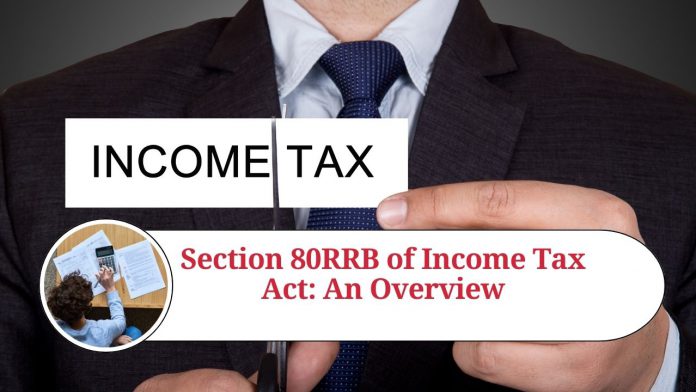When it comes to saving taxes, every penny counts. The Income Tax Act provides several tax-saving options, and one such provision is Section 80RRB. This section of the Income Tax Act provides a deduction for individuals who receive income from a registered patent. In this blog, we will discuss Section 80RRB in detail.
What is Section 80RRB of the Income Tax Act?
Section 80RRB of the Income Tax Act allows a deduction to an individual who receives income from a registered patent. This deduction is available to both resident and non-resident individuals. The deduction is available for a period of 10 years from the year in which the patent is registered.
Who is eligible for Section 80RRB deduction?
The following conditions must be satisfied for an individual to claim a deduction under Section 80RRB:
- The individual must be a resident or non-resident of India.
- The individual must have received income from a patent registered on or after April 1, 2003.
- The patent must be registered under the Patents Act, 1970.
- The individual must be the owner of the patent or must have the right to use the patent.
- The income must be in the form of royalty or consideration for the transfer of rights in the patent.
- The income must have been received during the previous year relevant to the assessment year for which the deduction is claimed.
How much deduction is allowed under Section 80RRB?
The amount of deduction allowed under Section 80RRB is equal to the amount of income received from the registered patent. However, the deduction cannot exceed Rs. 3 lakhs in a financial year.
For example, if an individual receives Rs. 2 lakhs as income from a registered patent during the financial year, the maximum deduction allowed will be Rs. 2 lakhs. However, if the individual receives Rs. 4 lakhs as income from a registered patent during the financial year, the maximum deduction allowed will be Rs. 3 lakhs.
How to claim a deduction under Section 80RRB?
To claim a deduction under Section 80RRB, the individual must file his/her income tax return in the prescribed form. The individual must also provide details of the income received from the registered patent in the income tax return. The income tax department may require the individual to provide proof of registration of the patent and the amount of income received from the patent.
Conclusion
Section 80RRB of the Income Tax Act provides a deduction to individuals who receive income from a registered patent. This deduction is available for a period of 10 years from the year in which the patent is registered. The deduction is equal to the amount of income received from the registered patent, subject to a maximum limit of Rs. 3 lakhs in a financial year. To claim a deduction under Section 80RRB, the individual must file his/her income tax return in the prescribed form and provide details of the income received from the registered patent.
Read more useful content:
- section 145 of income tax act
- section 10e of income tax act
- section 9 of the income tax act
- section 94b of income tax act
- section 206aa of income tax act
Frequently Asked Questions (FAQs)
Q1. What is Section 80RRB of the Income Tax Act?
A1. Section 80RRB of the Income Tax Act provides a deduction for individuals who receive income from a registered patent.
Q2. Who is eligible for a deduction under Section 80RRB?
A2. The deduction under Section 80RRB is available to both resident and non-resident individuals who receive income from a patent registered under the Patents Act, 1970.
Q3. How much deduction is allowed under Section 80RRB?
A3. The deduction under Section 80RRB is equal to the amount of income received from the registered patent. However, the deduction cannot exceed Rs. 3 lakhs in a financial year.
Q4. Is the deduction under Section 80RRB available to companies or firms?
A4. No, the deduction under Section 80RRB is available only to individuals who receive income from a registered patent.
Q5. Can a deduction be claimed for income received from a patent registered outside India?
A5. No, the deduction under Section 80RRB is available only for income received from a patent registered under the Patents Act, 1970 in India.
Q6. How long is the deduction available under Section 80RRB?
A6. The deduction under Section 80RRB is available for a period of 10 years from the year in which the patent is registered.
Q7. Can the deduction under Section 80RRB be claimed along with other deductions?
A7. Yes, the deduction under Section 80RRB can be claimed along with other deductions under the Income Tax Act.
Q8. Is it necessary to provide proof of registration of the patent to claim a deduction under Section 80RRB?
A8. Yes, the income tax department may require the individual to provide proof of registration of the patent and the amount of income received from the patent.
Q9. Can a deduction be claimed for income received from an unregistered patent?
A9. No, the deduction under Section 80RRB is available only for income received from a registered patent.
Q10. How to claim a deduction under Section 80RRB?
A10. To claim a deduction under Section 80RRB, the individual must file his/her income tax return in the prescribed form and provide details of the income received from the registered patent.




















